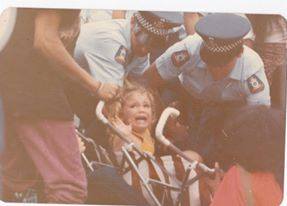For Victorian academic and writer Lillian Holt racism is “the gangrene of the soul of this nation which slumbers under the smug surface of this lucky country.” [53]. She labels it a “spiritual disease”.
Are Australians racist?
2,551 votes
Yes 77% No 23%
Source: SMH [58]
Are Australians racist?
Are Australians truly as open-minded and open-hearted as the world perceives them? Or does a multicultural mentality hide racism?
Read on to discover that racism in Australia is alive, it’s only hidden behind a friendly mask.
I do not accept that there is underlying racism in this country.—John Howard, Prime Minister of Australia (1996-2007) in 2005 [17]
I do not believe that racism is at work in Australia.—Kevin Rudd, Prime Minister of Australia (2007-2010) in 2010 [33]
Racism is still alive and evil in this country, I can assure you.—Colin Markham, former NSW parliamentary secretary for Indigenous affairs
We all know that racism is alive and well.—Aboriginal Reverend Aunty Alex Gater [35]
You don’t have to scratch the surface too hard in this country to find an awful underbelly of racism.—Linda Burney, NSW Deputy Opposition Leader [57]
How can you tell someone is racist?
Overt racism is easy to recognise, for example a person is denied a job or access to housing because of the colour of their skin.
Australians are “casually racist”
Casual racism (or “everyday racism”) is much more subtle, and often an expression of common prejudices, an expression of “racism deep within” [57].
“There certainly is a very strong element of casual racism in Australia,” says Gillian Triggs, president of the Australian Human Rights Commission [64]. Between June 2012 and June 2013, racial vilification complaints to the commission increased by 19%.
Australians tolerate jokes or statements by those who don’t realise they are causing offence. But if one person was offended by a joke, it is racist. Such jokes typically start with “An Australian, an Irishman and a South African walk into a bar…”
Racist slurs are general, derogative remarks about a group of people based on their race. Upon close inspection, most claims are incorrect.
Racism and racist remarks serve to bond with people who have the same opinion. Many people who have racist opinions somehow know that these are not accepted in mainstream society so they join political groups who share their racist views.
Casual racism includes racist insults, disrespectful treatment and mistrusting people from another ethic background. How media portray Aboriginal people can significantly influence people’s views.
Casual racism often starts with “I’m not racist, but…”—see next section for some examples.
NSW Anti-Discrimination Board president Stepan Kerkyasharian believes casual racism does not help Australians find a mature response.
“We tend to deal with some of these issues casually and then, when we realise that it has crossed the line, we tend to panic and go into ‘Oh my god’ mode to re-establish that this is not something we support,” he says [57].
Being passive can also be a form of racism. “The majority of Australians are not racist per se,” says Gerry Georgatos, a journalist writing for The Stringer, “however passivity is a layer of racism and that should always remain solid in everyone’s thinking.” [62] Examples include remaining passive when someone tells a racist joke or not responding when someone discriminates against Aboriginal people.
Dealing with racist people is not easy and can be very challenging, especially if you are the victim.
If I’m in a group of 50 people who aren’t Aboriginal who crack a joke about Aboriginal people and they all have a bit of a chuckle, I have to say that’s unacceptable. We have to call it for what it is. It’s racism.—Prof Shane Houston, Deputy Vice-Chancellor, University of Sydney (Indigenous Strategy and Services) [61]
“I’m not racist, but…”
How often have you heard someone starting a sentence with “I’m not racist, but…”? And what followed was an opinion you thought was racist.
- Andrew Johns, assistant coach of the Parramatta Eels rugby team, called an Aboriginal player a “black c**t” but “denied that he was racist” [36].
- Mal Brown, an Australian rules footballer, described Aboriginal people as “cannibals” but “declared himself… not racist” [36].
- Eddie McGuire, president of the AFL club Collingwood, suggested on radio that an Aboriginal footballer should promote a King Kong musical, but declared “I am not a racist” [57].
To be racist you don’t have to be extreme. “If you are being racially vicious in your remarks about other races, that’s racist,” says Timana Tahu, an Aboriginal rugby league player with the Parramatta Eels who sparked a nationwide discussion about racism when he walked out of the coveted NSW Origin team camp after Andrew Johns’ remarks [36].
Some people think that using racist slurs is being playful or assume racist words are slang. Racism in Australia is often cloaked by “larrikinism”, and Australians are very casual with racism [61].
FactAlmost 50% of white Australians believe Aboriginal people are given unfair advantages by the government. One in five people say they would move away if an Aboriginal Australian sat next to them. Almost 10% of non-Aboriginal people admit they would not hire an Aboriginal jobseeker. More than a third of people surveyed conceded they believe Aboriginal Aussies are “sometimes a bit lazy”. [70]
It’s almost like our racial discrimination has been hidden under larrikinism.—Harry O’Brian, AFL player [57]
We are still hearing the same things that my mother was hearing when she was little.—Timana Tahu, Aboriginal rugby league player [36]
Racism is never really seen, it’s only really felt.—Phill Moncrieff, Aboriginal musician [39]
Are Australians “the most racist people”? Read on to find out more (link of source provided below)
http://www.creativespirits.info/aboriginalculture/people/racism-in-aboriginal-australia


